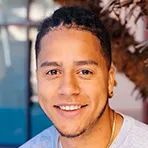Former Deloitte consultant Will Clark arrived at Stanford GSB intending to learn how to create banking solutions for disadvantaged populations. However, the former athlete often found himself talking to friends and classmates about his passion for sports, specifically the business of sports.
“Being a sports guy was always a big deal for me, but there was a level of time commitment and investment needed to be good at college football that I simply wasn’t willing to give,” says Clark, who, as an undergrad, played football at Carnegie Mellon University. “I was doing so many other things on campus that were a better expression of who I wanted to be.”
During his consulting career, Clark began using data to identify, understand, and solve business problems. When he melded that interest with his passion for sports, a logical career path opened up.
How did your interest shift from athletics to the business of sports?
So much of what I was doing in consulting was with banks. What was really exciting about that work was when I could create solutions to help real people and see the impact of my work all the way through. I wanted to do something around financial inclusion and creating banking solutions for people who were disadvantaged, but when I got to GSB all I wanted to do was talk about sports. So people were like, “Why don’t you translate that passion into a career?”
How did you start that process?
I did a lot of research in the first year about what working in sports actually looks like. I have family members who work in sports, but most of them are on the sporting side and not the business side. I got interested in fan engagement and monetizing assets because it was similar to the work I did consulting. I like being able to pinpoint who the customer is and how to target them better, how to take their data and drive revenue, how to create a better fan experience that has more operational efficiencies in the stadium, and how to measure the effectiveness of certain initiatives. Those are the types of problems I get excited about.
Tell us more about your internship helping develop the Dallas Trinity Football Club.
The team started in the USL Super League expansion league, which competes with the National Women’s Soccer League. I enjoyed the challenge of starting a new team, navigating the uncertainty of a new league, and being part of a real sports organization. It was a startup, so if I saw something that needed to be done, I would just do it, everything from our ticketing models to our merch launch to fan engagement trackers. I was planning game-day event operations. I was doing manual labor. I was even helping move players into their apartments. Just classic startup stuff. It allowed me to test which parts of the sports business I really liked.
Any significant takeaways?
I like thinking of solutions for sports teams and organizations from a how-do-we-support-the-fan perspective. I like to uncover stories from data. We discovered we were popular in a couple of affluent ZIP codes, and less popular in ZIP codes that had a high percentage of Spanish-speaking populations. We couldn’t figure out why and started to use data to try to uncover those answers.
In a LinkedIn post, you thanked Trinity team president for his mentorship. What about him do you want to emulate in your own career?
He is a listen-first-act-second type of executive. I was only there for eight weeks, but he showed me a level of trust before I’d really earned it. He’s a great listener and is super observant. Low ego. High IQ.
Some of your work at Deloitte focused on diversity, equity, and inclusion. Why do you feel those initiatives are important for companies to have?
It’s important to have different perspectives and different voices in the room. For a lot of companies, and for professional services specifically, we’re there to solve business problems for different Fortune 500 companies. If we’re designing a solution for small-business banking, for example, there are small businesses and people that come from different life circumstances. If we only have the perspectives of only a certain type of person in the room, we’re not as effective.
Can you cite a specific example of how diversity paid off?
I had a coworker who was Spanish-speaking first, and we were doing marketing outreach for a new credit card product. She would say that, for Spanish speakers, “we need something different and to say this in a different way.” I would have never thought about that. It allows you to design solutions for a wider subset of people and have a more holistic approach. Broadly, you can cover more bases by having many smart people with different interests and backgrounds.
Was it particularly important at Deloitte?
When I joined the Pittsburgh office, I was one of two Black consultants among about 80 people. I saw an opportunity to change that. Everyone wanted to diversify in our hiring but didn’t know how to go from that idea to conversion. I was able to leverage my contacts at clubs and interest groups for Black and Latino students at Carnegie Mellon and get our marketing information into those spaces. I talked to the faculty and CMU administration leaders to create awareness that this could be a career for those students, making sure I could connect any interested student with someone who looked like them, whether at Deloitte or not.
How did you fulfill your global experience requirement at the GSB?
I participated in a Global Study Trip to Brazil focused on entrepreneurship. We met with startups and incubators in the South American entrepreneurship scene. We had good food, learned Brazilian dancing, and saw a soccer game — a highlight for me.
Any GSB classes that will be especially helpful as you look toward your future?
I took sports management classes from professor George Foster that were absolutely incredible. The Business of Sports is about valuation in sports, and another class was about negotiation where he brought in guest speakers. I also did an independent study on the future of fan engagement. The other impactful class was I’m Just a Bill, taught by Keith Hennessey. It’s a simulation of the U.S. government where you’re trying to pass bills. I learned about influence and managing personal relationships versus professional relationships, and how you can do that with respect even when you’re giving tough feedback to a friend or voting against a friend’s interest. We disagreed, schemed, and politicked, but you learned to do it with high integrity.
Photos by Elena Zhukova


